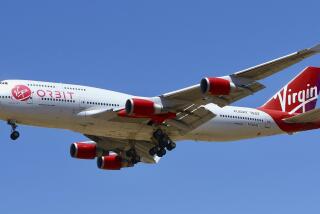‘85 Deal Was Troubled From Start
- Share via
Howard Hughes--playboy, Hollywood mogul, aviator and financial wizard--left behind a sprawling business empire that analysts considered to be the crown jewel of the aerospace business back in the mid-1980s.
So when General Motors Corp. acquired Hughes’ empire in 1985, GM’s chairman at the time, Roger B. Smith, touted the $5.2-billion deal as if he’d landed the bargain of a lifetime. Smith said the sale was structured to provide Hughes substantial autonomy “by maintaining the company intact as a separate and independent enterprise.”
Instead, the deal turned out to be a sour one almost from the outset, with GM trying to extract a rebate by asserting it was unaware of some of Hughes’ financial woes.
As Hughes’ executives originally feared, GM broke up the company to sell it off piecemeal. The last chunk of Hughes owned by GM, a 30% stake in Hughes Electronics Corp., is expected to be sold to one of two bidders after a GM vote today.
The move follows a tumultuous relationship between the two companies, in which GM floundered in its efforts to integrate and then dismantle the billionaire’s defense and electronics behemoth.
Hughes Aircraft grew from a virtual hobby shop run by the mogul’s lieutenants to the worlds’ largest defense electronics contractor. In the process, it became a pioneer in airborne radar, guided missiles and infrared optics. Former executives credit the firm’s quirky, loose culture with encouraging innovation.
From a strictly financial point of view, GM’s investment 16 years ago “worked out pretty well,” said Malcolm Currie, Hughes’ chief executive from 1988 to 1992. “From a cultural point of view, I think it was a disaster. We had a unique culture there, the best and brightest people in terms of innovation. But that’s all been broken up and attenuated. I don’t think, from a technical point of view, they got the true value they could have for their automotive business.”
Just three years after buying the business, GM entered into secret talks to reduce the price it paid, claiming it suffered tens of millions of dollars in unexpected losses on troubled defense contracts held by Hughes at the time of the deal. A private arbitration resulted in a renegotiation with more favorable terms for GM.
For years after the acquisition, the influence of Hughes’ eccentric founder, who championed a fierce independence among his various enterprises, lingered within the company. Its various divisions were autonomous, for example, sometimes using incompatible accounting systems.
By 1990, an entire generation of key Hughes leaders had retired, including the presidents of each of its six operating divisions. Moreover, GM’s hopes for synergy between the two companies dimmed as the difficulties of blending military and commercial technology became clear.
Engineers from Hughes contributed designs for the control and propulsion systems of GM’s electric cars, Currie said. But he said an effort to set up a division in Detroit devoted to systems engineering--an approach used by missile defense designers to make sure parts work together in a coordinated system--collapsed when it was rejected by auto executives.
The end of the Cold War brought a wave of changes, including a series of giant marriages among the nation’s defense contractors. Unprepared to gamble more cash on its defense business, GM remained largely out of the fray. Partly as a result, Hughes fell behind some of its competitors.
In 1997, near the end of the consolidation wave, GM sold Hughes’ defense operations, which included military radar systems and torpedoes, for $9.5 billion to rival Raytheon Corp. At the time, GM said the move “represents the best opportunity for Hughes’ defense business to remain a competitive participant in the industry.”
GM also saw the sale as a chance to cash in on the merger frenzy and to direct more cash into Hughes’ thriving space and telecommunications divisions.
Under GM’s watch, Hughes made its last break with the aerospace industry last year after pioneering commercial spacecraft for four decades. GM sold Hughes’ satellite business to Boeing Co. for $3.75 billion, leaving Hughes with a few service companies, including DirecTV. GM’s stake in what remains of Hughes Electronics has a stock market value of $4 billion.
More to Read
Inside the business of entertainment
The Wide Shot brings you news, analysis and insights on everything from streaming wars to production — and what it all means for the future.
You may occasionally receive promotional content from the Los Angeles Times.









